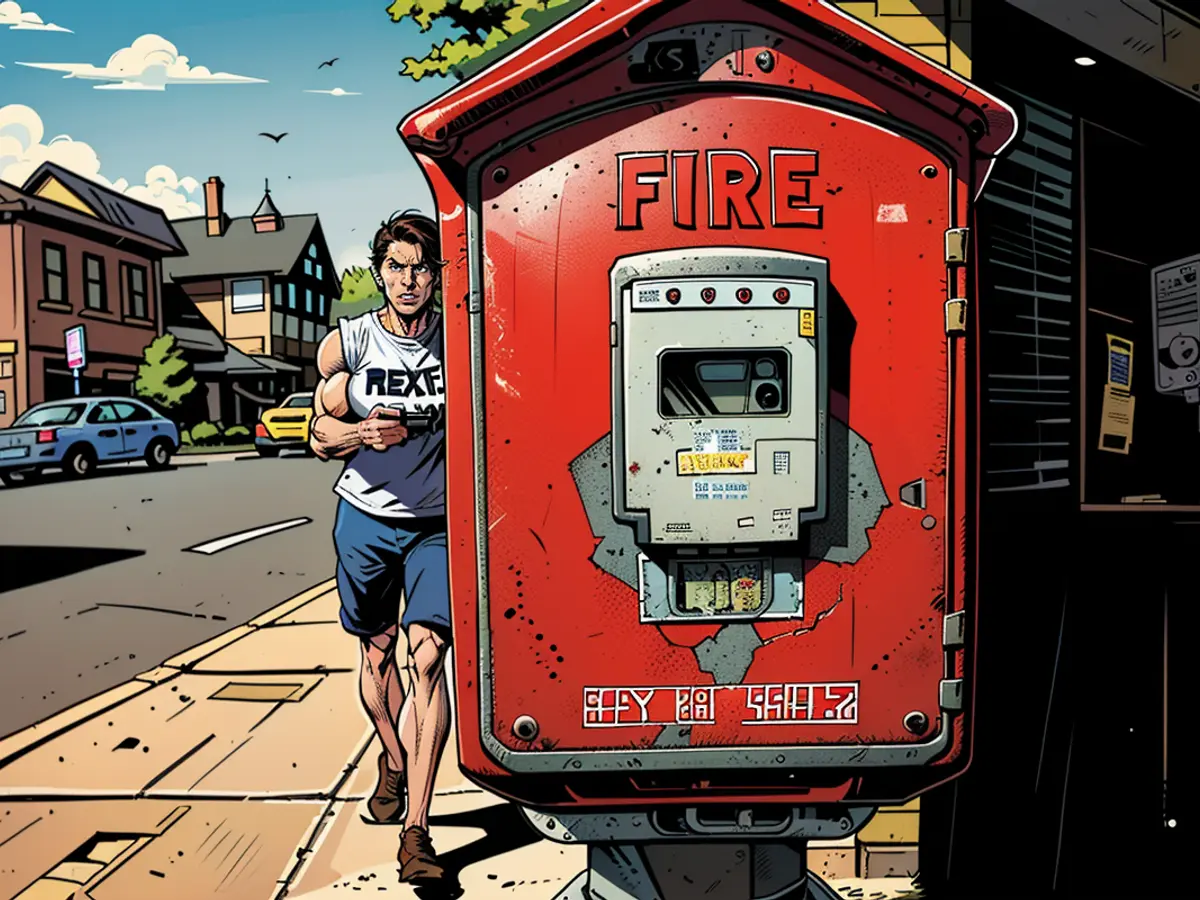In the Massachusetts crisis, the once-obsolete telegraph alarm boxes regained significant importance.
Use the seldom-noticed, fire-engine red emergency call boxes for assistance, they suggested. These antiquated yet dependable devices rely on the time-honored telegraph technology for transmitting distress signals.
During a press conference, Cox recommended, "If you encounter a medical, EMS, or fire emergency, approach the nearest call box, those little red light boxes mounted on street poles and building facades by the Fire Department. You can use them to summon help as well."
Likewise, the Boston Fire Department suggested on X, "In case of an emergency, pull your nearest Fire Box situated around the city." They accompanied their post with a snapshot of the device.
Indeed, the low-presence fire alarm boxes persist as an option for distress in Boston and various major American metropolises. Typically affixed to streetlamps and sides of buildings, these vintage devices - sometimes sun-beaten red - employ electronic telegraph technology to transmit an emergency call to the Fire Department headquarters. Simply raise the protective lid and tug on the hook.
As of current, around 1,500 fire alarm boxes dot Boston's streets, shared Michael Gerry of the Boston Fire Historical Society.
"These days, most folks are unaware of their existence," Gerry told CNN in a phone conversation. "With everyone carrying a cellphone, nobody uses them anymore."
Nevertheless, the devices continue to hum along independently on their own telegraph and power lines across the Hub, making them a steady backup during power outages or when 911 is unreachable.
The alarm boxes boast an illustrious history in Boston.
Samuel Morse invented the electric telegraph in the 1830s and 40s, hence enabling users to instantly communicate long distances, and shortly afterward, Boston natives William Channing and Moses Farmer advocated for adapting the technology to create a citywide electric fire alarm system.
On April 28, 1852, the system went live and made Boston the first city to establish such a municipal system. The first alarm was triggered and received the following evening at 8:25 p.m. to alert a minor blaze in a building at the junction of Charleston and Causeway streets, according to the Boston Fire Department.
The system portrayed a significant advancement over earlier methodologies such as ringing bells or shouting for help. In 2004, it was memorialized with a plaque in downtown Boston near the old city hall.
"Invented by William Channing and Moses Farmer, this system was highly effective in minimizing property damage and casualties caused by fire and was subsequently adopted across the United States and Canada," the plaque reads.
Each alarm box was mounted at specific locations within the city, each identified by a unique number, as detailed by the Boston Fire Historical Society. When a person pulls on the hook of a fire alarm box, it then sends a telegraph to the Fire Alarm Office with its number. Consequently, if someone triggers Box 2621, the office would receive the number 2, followed by 6, then 2, then 1, and recognize that an emergency exists near the box's designated location.
Over the passing 172 years, the appearance and functionality of the alarm boxes have evolved. However, they remain functional, particularly when more up-to-date systems break down, and systems remain active in cities like New York and San Francisco.
"The more sophisticated the technology, the more vulnerable it is to coding errors or glitches," Gerry informed CNN. "On the other hand, fire alarm boxes are rudimentary technology...but are not dependent on cutting-edge technology to function."
In December 2018, during another 911 outage, a Boston resident utilized an alarm box to report a fire on Endicott Street in the North End, as per CNN affiliate WBZ. "I commend the resident for knowing to pull that box," firefighter Marc Sanders told the affiliate.
Just recently, firefighters extinguished a fire at a well-known inn on Cape Cod after a clerk activated the fire alarm box and called 911, according to The Boston Globe.
However, 911 dispatch centers have largely made the old technology redundant. The fire alarm boxes facilitate one-way communication only and lack the means to communicate further messages or additional information. In addition, the Fire Department is incapable of knowing what awaits upon their arrival, whether it be a fire, a medical emergency, a law enforcement situation, or just a false alarm. Moreover, almost everyone today has a cellphone to dial 911.
In summary, the 911 system resumed functioning in less than two hours on Tuesday, thereby reducing the significance of fire alarm boxes. One individual did pull a fire box during the outage, but investigators found no evidence of an emergency, according to Boston Fire Department public information officer Brian Alkins.
No reports of emergencies were impacted by the outage, which a preliminary investigation revealed was attributed to a computer firewall incident and was not the result of a cyberattack or hack. However, the specific reason the firewall "stopped calls from reaching dispatch centers remains under investigation," as indicated by the state's office of public safety and security in a statement on X on Wednesday.
Massachusetts’ public safety answering system handled an average of 8,800 calls per day in 2023, according to the statement.
Even though many cities have removed fire alarm boxes, the outage highlighted their reason for persistence in Boston.
"I suppose we always will, due to instances such as (Tuesday)," Gerry declared.
Read also:
In the press conference, Cox urged the public, "If you're in Boston or any major American city and encounter an emergency, approach the nearest US-located call box." During a power outage or when 911 is unreachable, these vintage devices can still send a distress signal to the Fire Department headquarters.








